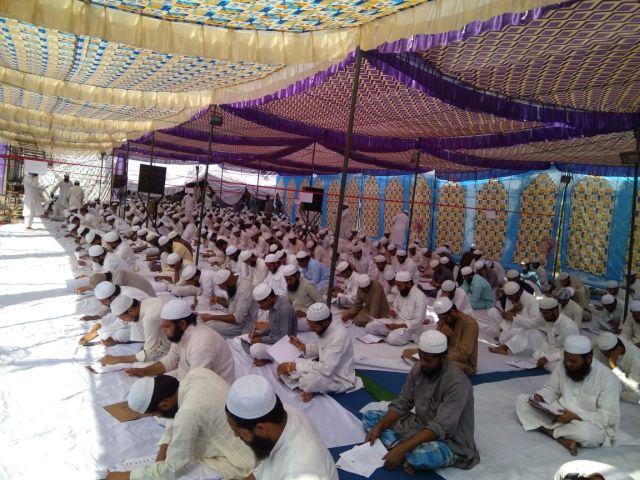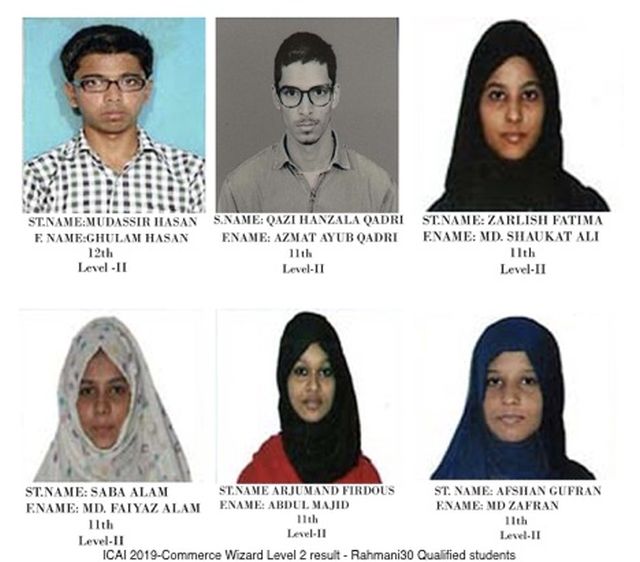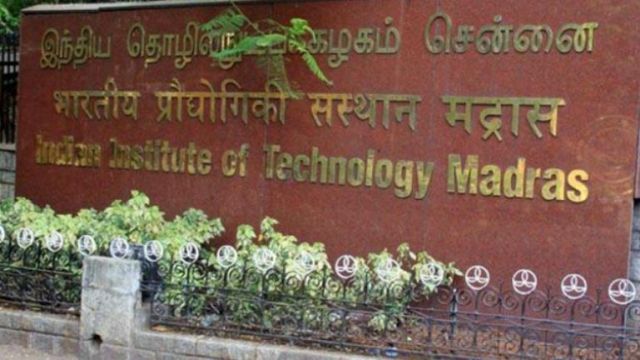
by admin | May 25, 2021 | News

The national level entrance exam for post madrasa Diploma in English Language and Literature (DELL) conducted by MMERC, Mumbai in Deoband last year.
By Maeeshat news,
Mumbai : Markazul Ma’arif Education and Research Centre (MMERC) announced the dates for the national level entrance exam for fresh madrasa graduates who wish to seek admission in the two-year Diploma in English Language and Literature (DELL) course for the batch 2019-21. In a press statement Maulana Mohammad Burhanuddin Qasmi, Director of MMERC, Mumbai stated that the written and spoken tests are scheduled on 21 and 23 March 2019, corresponding to14 and 16 Rajab, 1440 AH on Thursday and Saturday. The exams will be held at Heera Garden, Qasimpura Road, Near Eidgah in Deoband, (UP).
The press statement further detailed that the written exam will be held on Thursday and only those who passed it will be called to appear for the spoken exam on Saturday. Those candidates will be selected who have scored better combining both – the written and the spoken – exams for different MMERC affiliated branches across India.
Maulana MB Qasmi also said that this year the entrance exam would be for seven MMERC affiliated institutions from different states of India for a total 150 seats. Out of these 150, 30 at Markazul Ma’arif Education and Research Centre (MMERC), Mumbai, 10 at Markaz-e Islami Education and Research Centre (MIERC), Ankleshwar, Gujarat, 10 at Jamia Islamia Jalalia, Hojai, Assam, 25 at Al-Mahad Al-Ali Al-Islami, Hyderabad, 20 at Markaz Waliullah Education and Research Centre (MWERC), Haridwar, Uttarakhand, 30 at Markaz Ihyail Fikril Islami (MIFI), Muzaffarabad, Saharanpur, UP and 25 at Madni Foundation for Education, Research and Development (MFERD), Kashipur, Kolkata.
It is note worthy that MMERC is the first of its kind and a unique institution in the world for post madrasa education, established by Maulana Badruddin Ajmal in 1994, as part of Ajmal CSR initiative, where a two-year DELL course was introduced to impart quality English language education to madrasa graduates. Following the success of the DELL course a dozen plus other institutions in India have also started the same curriculum in their environs, eight among them are directly affiliated to MMERC, Mumbai this day.
MMERC covers a raft of subjects such as English language and literature, computer and communication, sociology, journalism, general studies and comparative studies of religions. The students are also exposed to interactive talks by experts on various important topics such as on science, arts, commerce, politics and other branches of learning and humanities so that upcoming ulama (madrasa graduates) are fully prepared to cope with present requirements and serve the country and the community better.
At MMERC, Mumbai and all its affiliated institutions in India teaching as well as lodging and food are free for the selected students, said Maulana Muddassir Ahmad Qasmi, national coordinator of DELL.
Maulana Burhanuddin Qasmi also went on to explain that MMERC holds a competitive type of objective and subjective exam for madrasa graduates every year where students are tested in various fields of Islamic knowledge such as Qur’an, its exegesis, hadith, fiqh, Arabic language and literature, as also their proficiency in writing in Arabic and Urdu and their awareness of general knowledge is tested. A candidate’s own ability and merit is the only criterion for getting selection at his chosen institution. Only those who have passed graduation from any madrasa in India can apply to sit for this exam, reads the press release.
Application forms with prospectus will be available at Students’ Coaching Centre, Qasimpura Road, Near Indra Park, Deoband and at all Centres. The same can also be downloaded freely from www.deoband.net from 7 March, 2019 onwards. The last date for application submission at Deoband is 19 March, 2019.

by admin | May 25, 2021 | News, Politics
 Srinagar : Prime Minister Narendra Modi said on Sunday that his dream was to see students from foreign countries coming to India for higher studies.
Srinagar : Prime Minister Narendra Modi said on Sunday that his dream was to see students from foreign countries coming to India for higher studies.
Answering a question on educational standards in India, Modi said: “My dream is that instead of our students going to other countries for higher studies, students from all over the world must come here to study.”
During his visit to Jammu and Kashmir on Sunday, Modi answered queries from students across the country after connecting with them digitally.
Over one lakh students from various states were digitally connected with Modi while over 2.5 crore others were able to connect with this interaction through social media.
On the digital revolution, Modi said: “Humankind has advanced over centuries but due to innovation and technological intervention during the last 40 years, we have taken a quantum jump.
“Digital revolution has changed our lives drastically. Time will come when perhaps coaching and classrooms could also become obsolete.”
Can India become a poverty free country?
“If India decides to rid itself of poverty, there is no power that can keep us poor,” he said.
“We are the fastest growing economy. Empowerment of the middle class is taking place at a fast pace and this is helping many amongst us to get rid of poverty.
“In 2014, rural sanitation was 35 per cent and today it is 98 per cent. We must take a firm resolve to get rid of poverty and it can only happen by empowerment of the poor.”
On linking education and tourism in Odisha, he said: “The first requirement of tourism is to take pride in our tourist places.
“Unless we pride ourselves on our tourist potential, we cannot fully explore its potential. During my visit to the US, I was shown a 400-year-old landmark in Pennsylvania. In our country, we can boast of thousands of years old landmarks.
“Homestay is popular throughout the world. We need to promote this in a big way to help our tourism.”
—IANS

by admin | May 25, 2021 | News
 By Maeeshat news,
By Maeeshat news,
Patna: Rahmani30, who have been preparing & propagating excellence in education among Muslim students have yet again set record success by representing 37.5% of all successful Muslims across India, and 100% of successful Muslims within its region Bihar in the “Institute of Chartered Accountants of India” ICAI Commerce Wizard Phase-2 test. The Commerce Wizard test by ICAI, is the tool to educate, motivate the students of Country to achieve excellence in commerce stream. ICAI is the only licensing cum regulating body of the financial audit and accountancy profession in India.
ICAI Commerce wizard test is conducted in two Levels. As per the results for the second phase of 2019 test, a total of 1013 students qualified across India, out of which 16 students are from the Muslim community, which includes 4 girls and 2 boys from Rahmani30, representing 100% successful Muslim students from Bihar.
Last year Rahmani-30 represented 50% of all successful Muslims of India in Level-1 test and this year it improved it’s the performance by registering success in Level-2 and representing 37.5% of all successful Muslim students, which indicates/suggests that they have a fresh effective approach towards excellence in education.
Rahmani30 has also started a new batch for commerce last year in Bangalore for NRI exclusively along with Indian Students. The test in the Gulf is scheduled to be on 15th February 2019. It would be interesting to see the outcomes from these batches.
The patron Hazrat Ml. Md. Wali Rahmani sb has congratulated all 1013 students and wished them success in their future endeavors. Shri. Abhayanand Sb (Ex. DGP Bihar) has expressed joy at the success of Rahman30 in the commerce arena and advised students to propagate & practice just and fair means in commerce, which is the true measure of the strength of any country. Mr. Ahmad Rahmani Ex.Director Strategy of UCLA-R has expressed his immense pleasure on the success of commerce students and congratulated Rahmani30 team.

by admin | May 25, 2021 | Entrepreneurship, Markets, News, Startup Basics, Technology
 Chennai : The Indian Institute of Technology Madras (IIT-M) on Friday launched a start-up to prepare the workforce for the advent of the Artificial Intelligence (AI) age by training students at nominal costs.
Chennai : The Indian Institute of Technology Madras (IIT-M) on Friday launched a start-up to prepare the workforce for the advent of the Artificial Intelligence (AI) age by training students at nominal costs.
The start-up “PadhAI” offers an affordable hands-on course on ‘Deep Learning’ which is the most successful sub-field of AI.
It is open to all students, faculty and professionals with a basic background in mathematics and Python.
The fee for students and faculty is Rs 1,000 and for working professionals Rs 5,000.
The start-up will also create AI-driven apps by collaborating with Small and Medium Enterprises and the industry and generate value for the Indian economy.
“The Indian IT industry has gone through several waves of technology and survived by upskilling. The current wave of AI is very different. It requires both mathematical insight and hands-on experience,” Mitesh Khapra, Assistant Professor at IIT-Madras, said in a statement.
“We need courses that strike the right balance between these two. Only then will India be able to produce visible products and services in the AI age,” he added.
Every year, the top performing students from courses on PadhAI will be invited to a summer garage — an AI residency programme at IIT-M Research Park where they can work on research, tackle problems of societal impact, or find solutions to commercial value.
The four-month course comprises 80 hours of lecture content and requires equivalent time in solving assignments. It will involve monthly contests and a capstone challenge that trains participants to build an app that works like Google Lens for a few Indian languages.
The course will begin from February 1. Registrations for the course are open until January 24.
—IANS

by admin | May 25, 2021 | Opinions

Image – ET
By Amit Kapoor,
Both China and India started building their national education systems under comparable conditions in the late 1940s. Different policies and historical circumstances have, however, led them to different educational outcomes, with China outperforming India not just in terms of its percentage of literate population and enrollment rates at all levels of education, but also in terms of number of world-class institutions in higher education, and greater research output.
The roots of China’s successful education system date back to the Cultural Revolution (1966-1976), which unintentionally expanded access to the primary education through democratising the schooling system, which was previously elitist in character, thus addressing the problem of mass illiteracy.
In contrast, India continued to focus on its higher education system since independence and only realised the importance of basic education in 1986, keeping it behind China and many other countries in Asia in educational development. In terms of enrollment, China reached a 100 percent gross enrollment rate (GER) in its primary education in 1985, whereas, India attained that level only in 2000.
In terms of secondary school enrollment, India and China both started at the similar rates in 1985, with about 40 percent of their population enrolled in secondary schools. However, due to a wider base of primary school students, the rate of increase in China has been much faster than in India, with 99 percent secondary enrollment rate in China and 79 percent in India in 2017.
India is closing in on the Chinese rate in terms of access to education, but on the literacy level front, there is a huge gap in the percentage of literate populations in the two countries. In the age group of 15-24 years, India scores 104th rank on literacy and numeracy indicator, compared to China’s 40th rank.
The OECD Programme for International Student Assessment (PISA), which assesses after every three years the domain knowledge of 15-year-old students in reading, mathematics, science and finance, revealed that students in China performed above the OECD average in 2015. Moreover, one in four students in China are top performers in mathematics, having an ability to formulate complex situations mathematically. Further, China outperforms all the other participating countries in financial literacy, by having a high ability to analyse complex finance products. For India, the comparable data is not available as it was not a participating country in PISA 2015.
However, in India, the Annual Status of Education Report (ASER) 2017 provides data for rural youth, aged 14-18, with respect to their abilities to lead productive lives as adults. According to this survey, only about half of the 14-year-old children in the sample could read English sentences, and more than half of the students surveyed could not do basic arithmetic operations, like division. For basic financial calculations, such as managing a budget or making a purchase decision, less than two-thirds could do the correct calculations.
With regard to the higher education system, both India and China dominate the number of tertiary degree holders because of their large population size, but when it comes to the percentage of the population holding tertiary degrees, only about 10 per cent and 8 per cent of the population possess university degrees in China and India, respectively. By contrast, in Japan, almost 50 per cent of the population holds a tertiary degree, and in the United States, 31 per cent of the population hold a tertiary degree.
In terms of the international recognition of universities, the Times Higher Education (THE) World University Ranking for 2019 places seven of the China’s universities in the top 200, compared to none for India. The global university rankings, which are based on various performance metrices, pertaining to teaching, research, citations, international outlook and industrial income, shows progress for several of China’s low-ranked universities, largely driven by improvements in its citations.
In fact, the Tsinghua University has overtaken the National University of Singapore (NUS) to become the best university in Asia due to improvements in its citations, institutional income and increased share of international staff, students and co-authored publications.
While India has progressed in terms of massification of education, there is still a lot which needs to be done when it comes to catching up with the China’s educational outcomes. China’s early start in strengthening its primary and secondary education systems has given it an edge over India in terms of higher education. Moreover, Chinese government strategies are designed in line with the criterion used in major world university rankings, especially emphasis is on the two factors which weigh heavily in the rankings — publications and international students.
The relentless publications drive, which is very evident in China, is weak in India and has led to a growing gap in the number of publications contributed by the two countries. Further, China enrolled about 292,611 foreign students in 2011 from 194 countries, while India currently only has 46,144 foreign students enrolled in its higher education institutions, coming from 166 countries. The large number of international enrollments in China is a reflection of its state policies granting high scholarships to foreign students.
To catch up with China, India needs to lay emphasis on improving its educational outcomes. Massification drive for education has helped India raise its student enrollments, but a lot needs to be done when it comes to global recognition for its universities. Further, it needs to focus on building the foundation skills which are acquired by students at the school age, poor fundamental skills flow through the student life, affecting adversely the quality of education system.
(Amit Kapoor is chair, Institute for Competitiveness. The views expressed are personal. He can be contacted at Amit.Kapoor@competitiveness.in and tweets @kautiliya. Deepti Mathur, senior researcher at large has contributed to the piece)
—IANS






